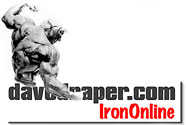What about Cholesterol?
There's an awful lot more to know about cholesterol than you'll get from tv, that's for sure, and probably even from your busy doctor. For starters, let's take a look at the good things—did you know cholesterol is vital for health?
Here's Dave with more on the value of cholesterol.
These days, most people know their total cholesterol count; some know their LDL and HDL counts (although fewer know which is considered good and which bad); fewer know the more important ratio between the two basic cholesterol types; and fewer still know further breakdowns exist in each type, let alone know where their own blood levels fit in the mix.
In recent years a rift has grown between those who fanatically believe that low LDL (low density lipoprotein, the "bad cholesterol") is the most important element to heart health and those who believe it's not important at all. Like most things, the truth likely falls between the two points.
Experts agree high HDL (the high density, "good" cholesterol) is protective against accumulating cholesterol blockage in the arteries. Raising your HDL is a worthy goal; the safest, cheapest and healthiest way to do this is with exercise... all exercise, but cardio exercise in particular. Other methods include niacin or estrogen treatments and will require your doctor's guidance, so start by upping your cardio intensity, which may do the trick for you without pills of any type.
Yes, about the cardio, make the time to do it. And if you cannot tolerate aerobic work due to boredom, here are some ideas on how to get your mind into your cardio effort, and here are thoughts on general conditioning, including sled pulling options.
While there's some controversy over the importance of low LDL cholesterol levels, there's no doubt high LDL in combination with raised inflammatory markers is deadly. You've heard of these, but likely have not had the blood tests done as they're not ordered automatically: Homocysteine, C-Reactive Protein, Lipoprotein /a, Fibrinogen. In laymen's terms, high levels of these give the LDL cholesterol something to stick to. (Bad juju.) This would give you two things to address, or more: lowering both the LDL and whichever markers were high. Fortunately, the treatment can also be the same: cardio, niacin, other supplements, perhaps statins or other pharmaceutical at least in the short term if your LDLs are extremely high.
If you do go on statins (or use red rice yeast to test as a natural substitute), review the research on the need for supplemental COQ10, as both statins and red rice yeast stop the production of COQ10 in addition to LDL production.
What about diet and cholesterol? Maybe your spouse heard a low-fat diet is the best way to go. Is that right? Not necessarily. The only certain way to clear arteries is ultra-low calorie intake, but that, of course, leads to other problems. However, it's true: People who starve to death have arteries that
are as "clean
as a baby's."
Lowered cholesterol via a low fat or vegetarian diet will apparently work for about 20% of all people. It's not true for everyone and
testing through trial and error would be the key because for many
people a lower carb diet would be better. In fact, a low fat diet can be disastrous for part of the population.
Your diet and exercise trial-and-error process could take an entire year of testing, changing for six weeks and testing again. But if you persevere, you'll discover the answer that's right for YOU, instead of blindly following the ads on your nightly television programs.
But wait! Don't relax just because you get your cholesterol results back and are told everything's "normal."
Both HDL (good) and LDL (bad) cholesterol is made up of a range of different types of particles and for a majority of the population, particle type is the key issue. Within the LDL class there are A and B families of particles and within these families, seven types of particles. Everyone has a mix of particle types, but if your heredity leads to a higher range of the denser particles within the LDL class, you have a problem—even if your total cholesterol is low or your HDL/LDL ratio is good.
Why I'm becoming familiar with this is that this
is a problem in Dave's family and a problem for Dave. His
total cholesterol is regularly around 130, which is quite low,
yet the particle type is dense, which is not good.
On
the other hand, if your total cholesterol is high but the
LDL "B" family
particles are light and fluffy, this is a much less dangerous condition than a condition such as Dave's.
As you can see, this is a much more complex subject than simply getting your cholesterol lower than the suggested 200. Spend a Saturday afternoon researching the potential problem; get a clear picture of the issues discussed above and methodically go to work plotting the health of your arteries and what, if anything, needs to be done to increase your arterial condition.
Our health and fitness database includes an archive on cholesterol and links to further information for your study.
Laree
Start here on your cholesterol information search
Click here to go to the Berkeley Heart Lab site for more information on advanced blood testing
Would you like to ask your questions or read answers to others in our online forum?
Click here to visit the supplement area of our online store.

